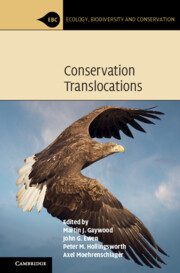Book contents
- Frontmatter
- Dedication
- Contents
- Contributors
- Foreword
- Preface
- Acknowledgements
- Part I Conservation Translocations: Getting Started
- Part II Conservation Translocations: The Key Issues
- Part III Conservation Translocations: Looking to the Future
- 13 From Genes to Ecosystems and Beyond: Addressing Eleven Contentious Issues to Advance the Future of Conservation Translocations
- Part IV Case Studies
- Index
- Plates
13 - From Genes to Ecosystems and Beyond: Addressing Eleven Contentious Issues to Advance the Future of Conservation Translocations
from Part III - Conservation Translocations: Looking to the Future
Published online by Cambridge University Press: 07 December 2022
- Frontmatter
- Dedication
- Contents
- Contributors
- Foreword
- Preface
- Acknowledgements
- Part I Conservation Translocations: Getting Started
- Part II Conservation Translocations: The Key Issues
- Part III Conservation Translocations: Looking to the Future
- 13 From Genes to Ecosystems and Beyond: Addressing Eleven Contentious Issues to Advance the Future of Conservation Translocations
- Part IV Case Studies
- Index
- Plates
Summary
The use of conservation translocations as a transdisciplinary conservation tool to prevent extinction, recover populations, and restore ecological function is on the rise. The growing impact of reintroductions, reinforcements, assisted colonisations, and ecological replacements can be attributed to a number of factors including an escalation of benefits for species, ecosystems, and human communities driven by bold innovations and courageous ambitions of the global conservation translocation community. The inclusion of diverse philosophical perspectives combined with increased need, interest, scope, and policy alignment has driven a broadening of novel approaches, innovations, and tools, but associated aspects can be contentious. To advance conservation impact of conservation translocations, we group eleven of these contentious issues into three broad categories – genes, species, and ecosystems – and then reframe them as growth opportunities. Contentious issues can create conflict, but we suggest that identifying common ground on agreed conservation values, negotiating with respectful kindness, and advancing progress through collaboration will enable powerful advancements for effective conservation translocations in the future.
Keywords
- Type
- Chapter
- Information
- Conservation Translocations , pp. 381 - 412Publisher: Cambridge University PressPrint publication year: 2022
- 1
- Cited by



